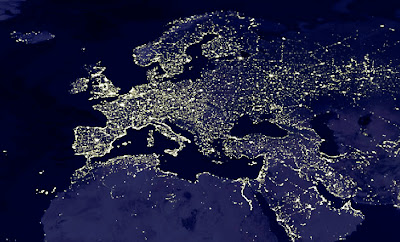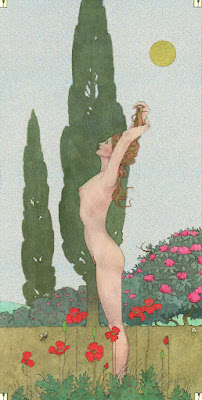Nothing is known of the life of
Homer although tradition has it that he was from the island of Chios. Most scholars estimate that the
Iliad was written during the second half of the 8th century BC.
Considering its depth and sophistication, this seems incredible.
The Classical Antiquity era lasted from the 8th century BC until the 6th century AD (1,300 years). What is classified as
The Hellenistic period (323-146 BC) was perhaps the richest period beginning with the death of Alexandra and finally ending with the Roman conquest. It was during this era that Greek culture and science, such as medicine and astronomy, had its influence in the Middle East. The Persians were among the first to translate the Greek treatises of medical science, for example.
The
Iliad is composed of 24 books. It, as well as the
Odyssey, are considered the magnificent culmination following several generations of the work of skilled oral poets and singers during an illiterate age.
The gruesome descriptions of hand to hand fighting describing the terrible, eg.
brain splattering damage
a long shadowed ash, bronze tipped spear could do, clearly indicates Homer's basic knowledge of human anatomy. The Greek poet also seemed to know how effective shields are made, and how best to drive a horse team in order to win a chariot race, for example. But what may strike one most with the
Iliad, despite the fury and violence of the Trojan War which is, of course, its essential theme, is a form of poetic, moral code and justice that finally prevails.
In the 12th and 13th centuries, over 2000 years later, during the 'Holy Wars', when the Crusaders fought the Muslim 'Saracens', each side was convinced that it had the firm support of God.
Heathens against
Infidels. But the Greek religion/
mythology was more, insular, patriarchal, philosophical, poetical and thus nuanced. The Greek gods of which Zeus is the most powerful, consist of a large family. Members even represent the elements, rivers, woods and human sentiments that weigh one way or the other according to their individual preferences. They also determine circumstances.
Like humans, they sometimes argue amongst themselves, but never too seriously. After all, they are immortal. They set the stage uniquely for Greek triumphs and tragedies. For them their various and incidental influences regarding the destiny of the ancient Greek mortal heros seem comparable to a casual yet fatal game of chess. A murderous game arbitrated finally by Zeus.
There are gods like
Poseidon, god of the sea, the god of earthquakes, and brother of
Zeus, son of
Kronos. He is against the Trojans. The goddess
Hera, wife and sister of Zeus also supports the Achaians against Troy. The same applies to goddess
Athene, daughter of Zeus. Whilst
Apollo, son of Zeus and
Leto, favours the Trojans, as does the goddess
Aphrodite daughter of Zeus and
Dione, etc.
Zeus is the god of weather, the power of thunder and lightening. He is the punisher of injustice and expulser of gods such as
Ate and
Hephaistos from
Olympos (a form of Heaven of the ancient Greeks, whereas
Hades personifies the underworld or a form of Hell). And as with all the Greek gods, even Zeus can be temperamental.
For those unfamiliar with the epic poem, very basically it's theme is part of the Trojan War. The war is in its tenth year. Achilleus, handsome, powerful demi-god leader and warrior, mortal son of the goddess Thetis, argues with Agamemnon who unreasonably refuses to concede to certain requirements despite a most generous offer.
Zeus favouring Achilleus' argument decrees that Agamemnon should be punished. The punishment first comes swiftly in the form of a plague brought about by Apollo reducing the power of the Achaian army. Nevertheless Agamemnon, strong king and leader, decides to continue the war against Troy with his armies and allies, still determined to sack the city, as the Trojans refuse to return Helen, the wife of Agamemnon's brother Menelaos, king of Sparta. Helen was seduced and abducted by the Trojan, Paris.
Because of his anger against Agamemnon however, Achilleus refuses to join him in battle. As Achilleus is the most feared of the Achaians, his refusal initiates a chain of consequences. Even powerful Agamemnon, Odysseus and Diomedes eventually have to withdraw wounded, while their armies suffer terrible losses due to the mighty fighting power of Hektor, of the glinting helmet. Gradually the Trojans, led by godlike Hektor', push the Achaians back towards their black, beaked and balanced fast ships with the objective to burn the fleet.
Achilleus is still adamant about not fighting, but he agrees that his dear friend Patroklos (also favoured by Zeus) should wear his personal and magnificent bronze armour and take his bronze tipped ash spears, to help push back the Trojans. This Patroklos does with great success, but he goes too far. Apollo deprives him of some of his armour and subsequently he is killed by Hektor who then takes Achilleus' glorious armour from Patroklos, and puts in on.
When Achilleus learns of the death of his friend, he is heart broken. The Achaians eventually succeed in retrieving Patroklos' body despite the Trojans trying to possess it. Achilleus asks his goddess mother Thetis to persuade the god Hephaistos, a cripple capable of forging miracles, to make him a new set of armour, which he agrees to, and accomplishes superbly.
Achilleus and Agamemnon finally reconcile with each other. Agamemnon, admitting to his previous stubborn blindness, offers once more the gifts he offered before to persuade Achilleus to forgive him. He also returns the woman (Briseïs) he previously took from Achilleus.
Achilleus is now determined to avenge the death of Patroklos and kill Hektor. He slaughters his way through the lines of the Trojans who retreat in terror of him. Godlike Achilleus is then tricked by Apollo intent on leading him away from the walls of Troy. When Achilleus realises this he quickly returns, and Hektor is waiting for him outside the walls of the city. Before Achilleus however, Hektor's nerve finally breaks and he runs away. He is chased three times round the city walls.
At this stage Zeus is uncertain about saving Hektor, but Athene, taking the form of Hektor's brother, tricks Hektor into thinking that Deïphobos (his brother) has come to help him fight Achilleus. When his brother is no longer beside him he realises that he's been tricked by the gods and will lose his life. The fight begins. He runs at Achilleus who sees where he can thrust his spear, and Hektor is killed. Before he dies however he begs Achilleus to allow his body to be returned to Troy for a proper burial ceremony. Achilleus, full of hate, promises him that his body will be eaten by dogs and birds. Hektor then makes the prophesy regarding Achilleus' own death (by Paris before the walls of Troy) before he finally dies. Such prophesies of the dying heros are also among the repeated themes of the Iliad.
Achilleus then drags Hektor by his feet behind his chariot. Hector's parents see all this, and when Hektor's wife Andromache, who was preparing for his return, learns of it, she collapses in grief.
Despite Achilleus' terrible sadness, he organises games in honour of Patroklos. After the games, still bitter and heart broken, Achilleus drags the body of Hektor each day, three times round the tomb of Patroklos. This lasts for eleven days. The gods become increasingly angry with this, for Hektor was also loved by Zeus.
Thetis is sent to warn her son and request that he release the body that the gods have beautifully preserved in spite of Achilleus' cruel treatment. At the same time Iris (another goddess) visits Priam, Hektor's father in Troy, to tell him to prepare a ransom to buy back his son's body, which he does.
Thus Priam goes to the fast ships of the Achaians with a generous ransom. He is protected by the gods enabling him to arrive before Achilleus. Although the powerful Achaian has slaughtered many of his sons, he kisses his murderous hands in supplication to release Hektor's body which Achilleus finally agrees to do.
Nine days are spent (also allowed by Achilleus before the war is resumed) in preparation of the funeral ceremony. (The same amount of time devoted to the burial ceremony of Patroklos).
Thus ends The Iliad. One might be left with a philosophical sentiment of poetic (or divine) justice that often seems to correspond with that of real life, when one's sense of judgement and discernment are undermined by immoderate ambition, vanity and short-sightedness. The same blind vanity and stupidity that incites rebellion and war even today, because almost 3,000 years later, human nature hasn't change.
Here's a short, typical, excerpt from book 11 of the Iliad. It depicts a scene of battle before Agamemnon is wounded. (Homer refers to the Greeks as Achaians, but also as Argives and Danaans, without any particular differentiation. Please note that this is a reference to the new prose translation by Martin Hammond. The names of the Greek heros in his version don't correspond with the names as already generally established in 'Romanised English', eg. Hector, Achilles, etc.,).
'So he spoke, and knocked Peisandros out of the chariot to the ground with a spear-blow to his chest: he crashed to the earth on his back and lay still. Hippolochos jumped down, and this one he killed on the ground: he sliced off arms and head with his sword, and sent the trunk rolling log-like through the mass of men. He let them lie, and leapt on to where the enemy ranks swarmed thickest, taking the other well-greaved Achaians with him. Then there was massacre and hacking bronze as soldiers cut down soldiers beaten into flight, and chariots fell on chariots- a cloud of dust rose under them from the plain, kicked high by the thundering hooves of horses. And lord Agamemnon drove on in pursuit, shouting to the Argives and killing all the time. As when an annihilating fire falls on a thick forest scrub, and the wind carries it billowing all over, and the bushes are brought down headlong in the flames' overwhelming onslaught, so the fleeing Trojans went down under Agamemnon, son of Atreus, and many strong-necked horses rattled empty chariots along the avenues of battle, missing the noble charioteers they knew: but they lay dead on the ground, a sight now to gladden the vultures, not their wives (...)'
__
Text. Intro © Mirino. Source- Homer. The Iliad. A new prose translation by Martin Hammond. With thanks. Top image-Achilles tending Patroclus (attributed to Sosias (potter, signed). Painting also attributed to Sosias 'or the Kleophrades painter or Euthymides'. Vase decoration. Tondo of an Attic red-figure kylix, ca 500 BC. From Vulci. Wikimedia Commons, with many thanks. January, 2011


















